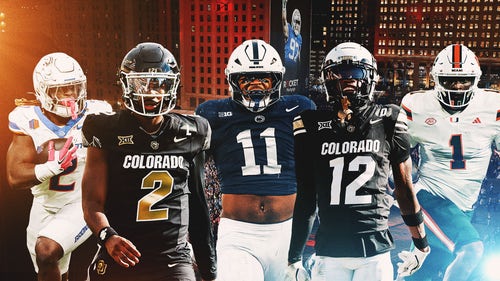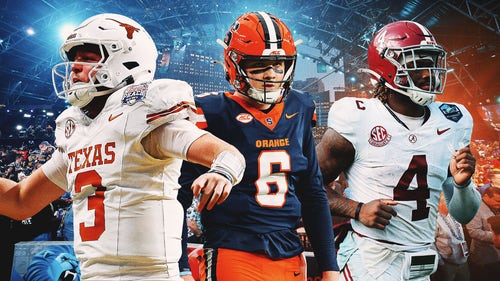
Manning family celebrates its Ole Miss legacy with Eli's jersey retirement
By Charlotte Wilder
FOX Sports Columnist
OXFORD, Mississippi — Eli Manning stood in the tunnel of Vaught Hemingway Stadium all by himself, hidden from the adoring crowds of Ole Miss fans above him in the stands.
Earlier that day, he’d been surrounded by throngs of admirers as he led the team he played for two decades ago down the Walk of Champions to the stadium. He had smiled and waved, his four kids with him, doing his public duty.
But this one quiet moment was his alone. He was wearing a well-tailored suit and very little expression on his face — certainly none of the goofy looks cameras used to catch on the Giants’ sidelines.

Surrounded by his four children, Eli Manning returned to Vaught Hemingway Stadium to have his No. 10 jersey retired by Ole Miss. (Photo by Kevin Langley/Icon Sportswire via Getty Images)
He didn’t look goofy at all on Saturday. He looked stoic, like a man who was trying to process the enormity of what he was about to witness: his life coming full circle in the place it began, even before he was born.
Manning didn’t smile when Ole Miss got a first down or scored a touchdown Saturday, but he grinned when one of his four kids would get antsy in his or her seat and run over to him. The kids clung to their father’s legs, silhouetted against the darkness of the tunnel he’d run out of so many times as a college player. His son and three daughters each wore a mini version of the jersey from the college career that led to Eli becoming the No. 1 pick in the 2004 NFL Draft, and the white print of the name and number 10 seemed to pop extra that day against the classic red fabric.
That’s why the family was there: the jersey. Having your number retired is always a big deal, no matter who or where you are, but it’s an even bigger deal when you’re a Manning and you’re in Oxford.
Not only are the Mannings the first family of football in America, but they’re also the first family of Ole Miss: Manning’s father, Archie, played there, and Archie’s jersey was one of only two retired numbers before his son’s became the third Saturday. The posted speed limit on campus remains 18 mph to honor Archie’s No. 18.
Archie, Eli's mother, Olivia, his wife, Abby McGrew (whom he met in college), and their children sat in folding chairs near the end zone as they waited to take the field for the halftime celebration honoring their son, husband and father. Manning’s older brother Cooper — another Ole Miss alum — had been on the field earlier with his son, Arch, but had since retreated, probably to a suite.

Archie Manning, right, watches as his son Eli becomes the third Ole Miss player to have his number retired. (Photo by Kevin Langley/Icon Sportswire via Getty Images)
Arch is currently the most sought-after high school football player in the country, and the young quarterback has been visiting schools all fall to see where he might want to play. As they left the field before the game, Cooper stopped Arch and pointed at the Jumbotron, where a video of Eli with his children was playing. Cooper smiled at his brother and watched for a little longer than everyone else with him.
Eli Manning’s brothers weren’t waiting for him when he finally left the tunnel and strode onto the field at halftime to the deafening appreciation of 64,523 fans. I didn’t see Peyton in Oxford on Saturday, but he could’ve been hidden away somewhere, as Cooper and Arch were for the ceremony.
This wasn’t the time for speculation as to where the next great Manning will play, and it wasn’t the time for Peyton to command any of the attention. This was about Archie’s youngest son, the less outgoing one, the enigma, the one who had a .500 career record in the NFL yet managed to beat Tom Brady in the Super Bowl twice.
Most speeches are too long, but Manning knows how to read a stadium, and he kept his short. He thanked his coaches, his teammates and his family and told the crowd what Ole Miss means to him.
Then he said this: "Seeing my No. 10 hang up there next to my dad's will be one of the greatest moments of my life. Thank you. I love Ole Miss. Hotty Toddy."
It was an emotional moment — the ultimate dream realized. But it was also a lot, and Manning seemed relieved when it was over. I found him in the tunnel afterward and asked him what, exactly, "Hotty Toddy" means to him.
"It’s a lifestyle," he said, smiling.
Manning represents Ole Miss — and Oxford — just about as well as anyone can. It is, indeed, a lifestyle.
Oxford is a quaint, little town with a main square. It reminded me of a Boston suburb: manicured, neat and navigable, with a hint of "Stepford Wives" vibes. But most of all, it's the epitome of Southern charm.
Everyone knows everyone in Oxford. I spent a lot of time walking around the many shops, and I couldn’t go 10 feet without watching friends and families run into one another. I watched one older man stop his truck to let another man cross the street, and then he yelled out the window in a playful tone, "Hey, watch where you’re going!" The other laughed and went up to the driver’s side window to catch up.
The closest big airport to Oxford is in Memphis, and as the gentleman who drove me to Oxford said, "This is a town where if you scratch my back, I’ll scratch yours. And if something goes wrong, I’m gonna know about it."
The Mannings embody that sense of connection and legacy.
Archie planted roots in Oxford that grew into the trees of Eli, Cooper and, potentially, Arch. I’m speculating here, but I imagine it’s difficult to watch your uncle’s number be unveiled next to your grandfather’s and not think, "Hey, maybe mine could be up there someday, too."
But legacies in Oxford are also complicated. There is a past and present in this town that isn’t adorable or cute, one that isn’t just Solo cups and boutiques. The density of narratives in Oxford is as palpable as the grey mist and gentle drizzle that hung around the town square Thursday morning, when I walked to get a coffee.
On that 10-minute stroll to the square, I passed about six churches, a prison, a storefront purporting to help with jail bonds, a few gas stations and many bars. Once I got to the square, I marveled at the big, white courthouse and all the two-story buildings with wraparound porches on each level.
Historical markers dot the place, detailing battles the Confederate army fought against the Union troops, and many of the buildings in the square were rebuilt after the northern army burned the town to the ground during the Civil War. One historical sign said the town was working on becoming more progressive.
All that violence wasn’t so long ago. Time has a way of expanding, but my great-grandfather knew a man who knew Abraham Lincoln. Connection brings communities such as Oxford together, but it also links them to the past — and for Oxford, as for a lot of the South, much of its history is ugly. The text on those plaques is an important reminder of what paved the road I was walking on to find an iced Americano in 2021.
The Grove — the large field where everyone tailgates — is all about connection. It reminded me of an office with a cubicle-based floor plan, but instead of gray dividers, there were red and blue tents butting up against one another for as far as I could see. Everyone is welcome at every party, and in this town with 35,000 locals, most of them go there on Saturdays, whether they have game tickets or not. It’s a good time. Music blares from every tent. Everyone invites you in for a drink. No one seems unhappy.
"We might lose the game, but we’ve never lost the party," mixologist and restaurateur Taariq David — who is originally from Washington, D.C., and moved to Oxford a few years ago with his wife and four kids — told me Friday.
People dress up for games and tailgates at The Grove in a way they don’t in other college towns. Most men wear dri-fit golf shirts, quarter-zips, khaki pants, neatly tied leather shoes. Pledges wear blazers. Things have gotten more casual, though, so you also see a few jerseys here and there. Most women wear flouncy, red tops and skirts or dresses paired with high, white boots.
Everyone cheered as the football team, made up of mostly Black players, strolled through. The school didn’t admit its first Black student until 1962.
Ole Miss pulled off the win Saturday. Coach Lane Kiffin might seem a little kooky — and there are rumors about his partying antics around town — but the man has resurrected a program with the help of Heisman contender Matt Corral at quarterback. Kiffin is winning, so the town has embraced him as its own (at least for now). He hosts a radio show every Thursday from the balcony of a local restaurant, and I saw a fair amount of fans adopting his signature visor look.
Most things in Oxford go back generations. Even Landry’s, a popular menswear store, has existed since 1891. But Oxford (unlike a lot of small places, in my experience) seems to welcome new people and invite them to put down roots. The bartender David, even the Mannings — they didn’t grow up there. And in fact, about 30 percent of people who attend Ole Miss from out of town choose to stay in Oxford.
What it comes down to seems very simple: You either understand and love what Manning says "Hotty Toddy" means (even though it has no real definition), or you don’t.
And if you do, you’ll feel right at home.
Charlotte Wilder is a general columnist and cohost of "The People's Sports Podcast" for FOX Sports. She's honored to represent the constantly neglected Boston area in sports media, loves talking to sports fans about their feelings and is happiest eating a hotdog in a ballpark or nachos in a stadium. Follow her on Twitter @TheWilderThings.










